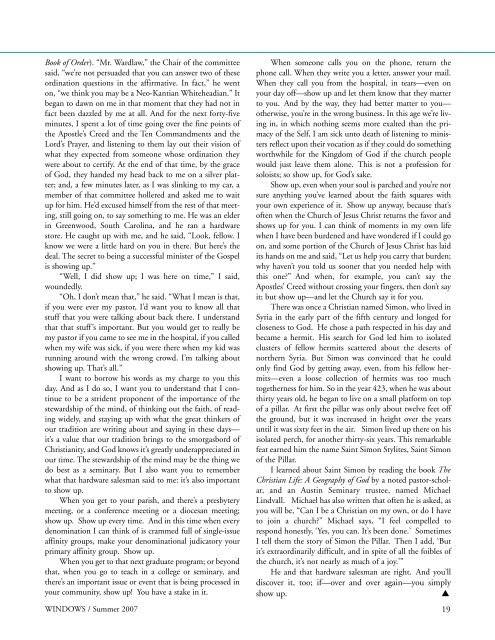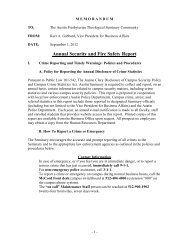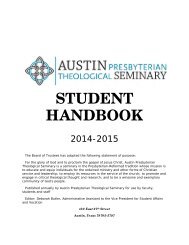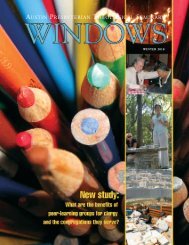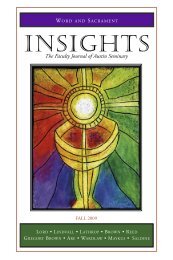AUSTIN PRESBYTERIAN THEOLOGICAL SEMINARY
windows summer 07 - Austin Presbyterian Theological Seminary
windows summer 07 - Austin Presbyterian Theological Seminary
- No tags were found...
You also want an ePaper? Increase the reach of your titles
YUMPU automatically turns print PDFs into web optimized ePapers that Google loves.
Book of Order). “Mr. Wardlaw,” the Chair of the committee<br />
said, “we’re not persuaded that you can answer two of these<br />
ordination questions in the affirmative. In fact,” he went<br />
on, “we think you may be a Neo-Kantian Whiteheadian.” It<br />
began to dawn on me in that moment that they had not in<br />
fact been dazzled by me at all. And for the next forty-five<br />
minutes, I spent a lot of time going over the fine points of<br />
the Apostle’s Creed and the Ten Commandments and the<br />
Lord’s Prayer, and listening to them lay out their vision of<br />
what they expected from someone whose ordination they<br />
were about to certify. At the end of that time, by the grace<br />
of God, they handed my head back to me on a silver platter;<br />
and, a few minutes later, as I was slinking to my car, a<br />
member of that committee hollered and asked me to wait<br />
up for him. He’d excused himself from the rest of that meeting,<br />
still going on, to say something to me. He was an elder<br />
in Greenwood, South Carolina, and he ran a hardware<br />
store. He caught up with me, and he said, “Look, fellow. I<br />
know we were a little hard on you in there. But here’s the<br />
deal. The secret to being a successful minister of the Gospel<br />
is showing up.”<br />
“Well, I did show up; I was here on time,” I said,<br />
woundedly.<br />
“Oh, I don’t mean that,” he said. “What I mean is that,<br />
if you were ever my pastor, I’d want you to know all that<br />
stuff that you were talking about back there. I understand<br />
that that stuff’s important. But you would get to really be<br />
my pastor if you came to see me in the hospital, if you called<br />
when my wife was sick, if you were there when my kid was<br />
running around with the wrong crowd. I’m talking about<br />
showing up. That’s all.”<br />
I want to borrow his words as my charge to you this<br />
day. And as I do so, I want you to understand that I continue<br />
to be a strident proponent of the importance of the<br />
stewardship of the mind, of thinking out the faith, of reading<br />
widely, and staying up with what the great thinkers of<br />
our tradition are writing about and saying in these days—<br />
it’s a value that our tradition brings to the smorgasbord of<br />
Christianity, and God knows it’s greatly underappreciated in<br />
our time. The stewardship of the mind may be the thing we<br />
do best as a seminary. But I also want you to remember<br />
what that hardware salesman said to me: it’s also important<br />
to show up.<br />
When you get to your parish, and there’s a presbytery<br />
meeting, or a conference meeting or a diocesan meeting;<br />
show up. Show up every time. And in this time when every<br />
denomination I can think of is crammed full of single-issue<br />
affinity groups, make your denominational judicatory your<br />
primary affinity group. Show up.<br />
When you get to that next graduate program; or beyond<br />
that, when you go to teach in a college or seminary, and<br />
there’s an important issue or event that is being processed in<br />
your community, show up! You have a stake in it.<br />
When someone calls you on the phone, return the<br />
phone call. When they write you a letter, answer your mail.<br />
When they call you from the hospital, in tears—even on<br />
your day off—show up and let them know that they matter<br />
to you. And by the way, they had better matter to you—<br />
otherwise, you’re in the wrong business. In this age we’re living<br />
in, in which nothing seems more exalted than the primacy<br />
of the Self, I am sick unto death of listening to ministers<br />
reflect upon their vocation as if they could do something<br />
worthwhile for the Kingdom of God if the church people<br />
would just leave them alone. This is not a profession for<br />
soloists; so show up, for God’s sake.<br />
Show up, even when your soul is parched and you’re not<br />
sure anything you’ve learned about the faith squares with<br />
your own experience of it. Show up anyway, because that’s<br />
often when the Church of Jesus Christ returns the favor and<br />
shows up for you. I can think of moments in my own life<br />
when I have been burdened and have wondered if I could go<br />
on, and some portion of the Church of Jesus Christ has laid<br />
its hands on me and said, “Let us help you carry that burden;<br />
why haven’t you told us sooner that you needed help with<br />
this one?” And when, for example, you can’t say the<br />
Apostles’ Creed without crossing your fingers, then don’t say<br />
it; but show up—and let the Church say it for you.<br />
There was once a Christian named Simon, who lived in<br />
Syria in the early part of the fifth century and longed for<br />
closeness to God. He chose a path respected in his day and<br />
became a hermit. His search for God led him to isolated<br />
clusters of fellow hermits scattered about the deserts of<br />
northern Syria. But Simon was convinced that he could<br />
only find God by getting away, even, from his fellow hermits—even<br />
a loose collection of hermits was too much<br />
togetherness for him. So in the year 423, when he was about<br />
thirty years old, he began to live on a small platform on top<br />
of a pillar. At first the pillar was only about twelve feet off<br />
the ground, but it was increased in height over the years<br />
until it was sixty feet in the air. Simon lived up there on his<br />
isolated perch, for another thirty-six years. This remarkable<br />
feat earned him the name Saint Simon Stylites, Saint Simon<br />
of the Pillar.<br />
I learned about Saint Simon by reading the book The<br />
Christian Life: A Geography of God by a noted pastor-scholar,<br />
and an Austin Seminary trustee, named Michael<br />
Lindvall. Michael has also written that often he is asked, as<br />
you will be, “Can I be a Christian on my own, or do I have<br />
to join a church?” Michael says, “I feel compelled to<br />
respond honestly, ‘Yes, you can. It’s been done.’ Sometimes<br />
I tell them the story of Simon the Pillar. Then I add, ‘But<br />
it’s extraordinarily difficult, and in spite of all the foibles of<br />
the church, it’s not nearly as much of a joy.’”<br />
He and that hardware salesman are right. And you’ll<br />
discover it, too; if—over and over again—you simply<br />
show up.<br />
▲<br />
WINDOWS / Summer 2007 19


